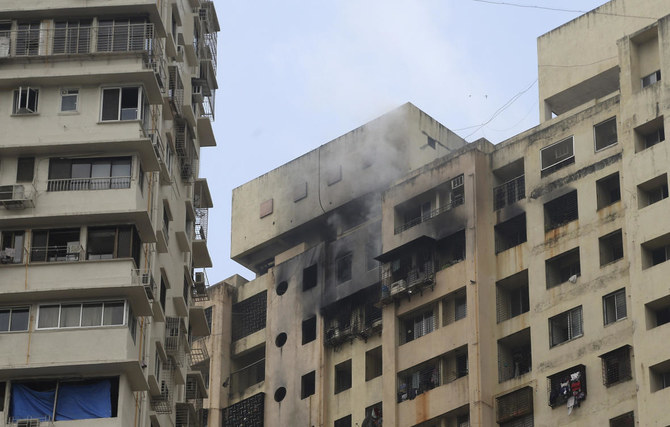NEW DELHI: A major fire in a 19-story residential building killed at least six people and injured 15 others on Saturday in Mumbai, India’s financial and entertainment capital, officials said.
The fire was caused by a short-circuit in an air conditioner in one of the apartments, Mumbai Mayor Kishori Pednekar said.
Residents said the fire started on the 15th floor and a big column of black smoke soon enveloped the building. More than 90 people escaped the building on their own or helped by neighbors, they said.
Ganesh Purnaik, a spokesman for the city government, said the fire left six people dead and 15 hospitalized with injuries.
Four of the injured were in critical condition, said police officer Saurabh Tripathi.
Nearly two dozen fire engines extinguished the blaze and controlled the smoke after a two-hour effort, media reports said. Firefighters rushed the injured to two nearby hospitals.
Pednekar said some of the injured needed oxygen support because they had inhaled smoke.
Fires are common in India, where building laws and safety norms are often flouted by builders and residents.
In August, a fire killed eight coronavirus patients at a hospital in Ahmedabad, a major city in Gujarat state. In December 2018, a late-night fire in a Mumbai restaurant killed 15 people.
Fire in residential building kills 6, injures 15 in Mumbai
https://arab.news/b8vp6
Fire in residential building kills 6, injures 15 in Mumbai

- The fire was caused by a short-circuit in an air conditioner in one of the apartments
- Nearly two dozen fire engines extinguished the blaze and controlled the smoke after a two-hour effort
Britain, Japan agree to deepen defense and security cooperation

- “We set out a clear priority to build an even deeper partnership in the years to come,” Starmer said
- Takaichi said they agreed to hold a meeting of British and Japanese foreign and defense ministers this year
TOKYO: Britain and Japan agreed to strengthen defense and economic ties, visiting Prime Minister Keir Starmer said on Saturday, after his bid to forge closer links with China drew warnings from US President Donald Trump.
Starmer noted that Japan and Britain were the leading economies in a trans-Pacific that includes fellow G7 member Canada, as well as other international trade and defense pacts.
“We set out a clear priority to build an even deeper partnership in the years to come,” Starmer said as he stood beside Japan’s Prime Minister Sanae Takaichi after a bilateral meeting in Tokyo.
“That includes working together to strengthen our collective security, across the Euro-Atlantic and in the Indo-Pacific.”
Takaichi said they agreed to hold a meeting of British and Japanese foreign and defense ministers this year.
She said she also wanted to discuss “cooperation toward realizing a free and open Indo-Pacific, the Middle East situation and Ukraine situation” at a dinner with Starmer later on Saturday.
Starmer arrived on a one-day Tokyo stop after a four-day visit in China, where he followed in the footsteps of other Western leaders looking to counter an increasingly volatile United States.
Leaders from France, Canada and Finland have all traveled to Beijing in recent weeks, recoiling from Trump’s bid to seize Greenland and tariff threats against NATO allies.
Trump warned on Thursday it was “very dangerous” for its close ally Britain to be dealing with China, although Starmer brushed off those comments.
Tokyo’s ties with Beijing have deteriorated since Takaichi suggested in November that Japan could intervene militarily during a potential attack on Taiwan.
China regards the self-ruled democratic island as its territory.
Starmer met Chinese President Xi Jinping and Premier Li Qiang on Thursday, with both sides highlighting the need for closer ties.
He also signed a series of agreements there, with Downing Street announcing Beijing had agreed to visa-free travel for British citizens visiting China for under 30 days.
No start date for that arrangement has been given yet.
Takaich said the two leaders agreed during discussions on economic security that a strengthening of supply chains “including important minerals is urgently needed.”
There is concern that Beijing could choke off exports of the rare earths crucial for making everything from electric cars to missiles.
China, the world’s leading producer of such minerals, announced new export controls in October on rare earths and associated technologies.
They have also been a major sticking point in trade negotiations between China and the United States.
Britain, Japan and Italy are also developing a new fighter jet after Tokyo relied for decades on the United States for military hardware.














